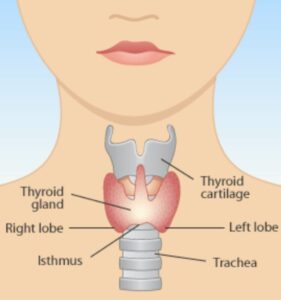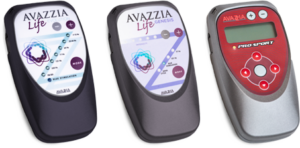
If your thyroid gland isn’t working as it should, you probably live with a handful of uncomfortable and life-disrupting symptoms. But did you know that using microcurrent for thyroid health is an accessible, all-natural solution that is changing the lives of thousands worldwide?
If you’re ready to learn about the thyroid gland, the symptoms of hypothyroidism and hyperthyroidism, and how microcurrent can help – read on! This blog is for you.
What Is Your Thyroid?

The thyroid is a large gland located in the front of the neck. It works to produce essential hormones that regulate growth and development through your metabolism.
When your thyroid makes the wrong amount of these essential hormones, it’s called thyroid disease. There are several different kinds of thyroid conditions and diseases that can impact your wellbeing, including:
- Hyperthyroidism
- Hypothyroidism
- Thyroiditis
- Hashimoto’s thyroiditis
- Goiter
- Graves’ disease
- Thyroid cancer
- Thyroid nodule
Irregular thyroid hormone levels are known to cause significant health effects, so managing your thyroid disorder is imperative. And here’s the thing – thyroid blood tests are often inaccurate.
What Causes Thyroid Disease?
Hypothyroidism and hyperthyroidism are the most prominent types of thyroid disease. Both conditions can be triggered by other diseases that impact the way the thyroid gland functions. Before diving into using microcurrent for thyroid health, let’s look at some conditions that can contribute to thyroid dysfunction.
Five conditions can contribute to thyroid disease:
- Thyroiditis. This condition causes swelling and inflammation of the thyroid. Thyroiditis has been known to lower the number of hormones your thyroid creates.
- Hashimoto’s thyroiditis. Hashimoto’s is an autoimmune condition. It occurs when your body’s cells attack and harm the thyroid. This condition is inherited.
- Postpartum thyroiditis. It’s estimated that 5% to 10% of women experience this condition after childbirth. Luckily it is usually temporary, but uncomfortable side effects like lethargy, irritability, and constipation can significantly affect the quality of your life.
- Iodine deficiency. Your thyroid needs iodine to produce hormones. If you’re not getting enough iodine through your diet, your thyroid may cease to function as it should. Research shows that a shocking 1.9 billion people worldwide suffer from an iodine deficiency. Getting proper amounts of iodine is especially important during pregnancy as iron deficiency can lead to cretinism, stillbirth, and miscarriage. Even moderate deficiency can cause a significant loss of learning ability in young children.
- A non-functioning thyroid. Some people are born with a non-functioning thyroid. This affliction affects roughly 1 in 4,000 infants. If left untreated, a child can develop both physical and mental issues later in life. Because of this, newborns are usually given a thyroid screening in the hospital.
You may be wondering, “what causes thyroid dysfunction?” Here are just four situations that can contribute to thyroid imbalances:
- Graves’ disease. Marked by an enlarged thyroid gland (or toxic goiter), Graves’ Disease is a condition that is triggered by an overactive thyroid that produces too much hormone.
- Nodules. Nodules are an abnormal clump of cells that reside on the thyroid gland, which causes it to overreact – producing too much hormone. If you find a thyroid nodule, you may be worried that it could be cancer, but the good news is over 90% of identified thyroid nodules are clinically determined to be benign lesions. In contrast, 4%-6.5% are due to thyroid cancer.
- Thyroiditis. This disorder can last from a couple of weeks to a few months and is marked by an excessive flood of hormones being released. Thyroiditis is caused by antibodies, drugs, and organisms like viruses and bacteria.
- Excessive iodine. As we always say here at Pain Free For Life, too much of a good thing is bad, and iodine is no different. Excessive iodine levels in the body can be caused by medications like amiodarone, a heart medication, over-the-counter supplements, cough syrups, over iodized salt, animal milk, drinking water, and certain seaweeds.
Additional causes of thyroid problems include exposure to radiation and exposure to harmful EMFs in your environment. To learn more about how EMFs affect your thyroid and overall wellness, please read our blog, Are You Protected From EMFs?
Stress and Thyroid Dysfunction – A Dangerous Combination
Stress alone can’t cause a thyroid disorder or disease, but it definitely doesn’t help. And because thyroid abnormalities can induce mood, anxiety, psychotic, and cognitive disorders – you could find yourself stuck in a vicious cycle of mental health woes, increased stress, and physical depletion if your condition isn’t addressed.
How does stress affect the thyroid?
If you remember reading our blog on adrenal fatigue, you probably remember that the thyroid works in tandem with your adrenals. The adrenals are great at processing small amounts of stress. But problems arise when you experience an accelerated level of stress which sets off a release of cortisol in your bloodstream.
What are the results of stress-related thyroid dysfunction?
- Slowed metabolism
- Insulin resistance
- Stress and depression
Unfortunately, blood tests cannot always catch thyroid disorders, and medications cannot always keep up with constant changes in your body caused by stress. This is why we highly recommend integrating stress-relieving techniques into your lifestyle like grounding, meditation, yoga, Thai Chi, and Vagus Nerve Stimulation.
If you would like more help in managing the insidious nature of stress, please read our blog, How to Effectively Deal with Stress and Get Your Life Back.
Living With Thyroid Disease – A Seemingly Uphill Battle
If you’ve been clinically diagnosed with a thyroid disorder – or suspect you are experiencing an undiagnosed thyroid disorder – there’s a good chance you’re living in a world of hurt. Some people with thyroid problems describe themselves as feeling uneasy in their own bodies, and that’s not fair.
To help you feel comfortable in your skin, we thought we’d address some common symptoms of the two most common thyroid disorders (hypothyroidism and hyperthyroidism) and explain how microcurrent can help you feel your best each day.
Symptoms of Hyperthyroidism
An overactive thyroid gland causes hyperthyroidism. The following symptoms can present in those with this condition:
- Irritability, anxiety, and nervousness
- Insomnia
- Weight loss
- And enlarged thyroid
- Muscle tremors or weakness
- Irregular or sparse menstrual periods
- Sensitivity to heat
- Vision problems
Symptoms of Hypothyroidism
Hypothyroidism, or an underactive thyroid, can cause the following symptoms:
- Fatigue
- Weight gain
- Forgetfulness
- Unusually heavy menstrual periods
- Dry, coarse hair
- A hoarse voice
- Intolerance to cold temperatures
Why Choose Microcurrent for Thyroid Health?

Now, let’s get to the solution – microcurrent for thyroid health. As we mentioned in our blog on Hashimoto’s Disease, thyroid dysfunction and inflammation go hand-in-hand. How can you combat inflammation? By normalizing thyroid function with microcurrent therapy – Vagus nerve stimulation in particular. In our experience, when stacked against other natural remedies for thyroid health, microcurrent has been proven to be the most effective.
How is The Vagus Nerve and Thyroid Connected?
The Vagus Nerve engages with various hormones in the body, and as you know, the thyroid’s primary function is hormone regulation and release. The essential thyroid hormone, T3, works to stimulate the Vagus Nerve resulting in increased appetite and the creation of ghrelin. Ghrelin also promotes the Vagus Nerve to increase hunger – this can be beneficial in those with hyperthyroidism. Conversely, insulin is known to decrease glucose release from the liver to stimulate the Vagus nerve. Long story short – if you can regulate the Vagus nerve’s functionality, you will achieve a better balance of hormones in your body. A better balance of hormones means fewer weight-related problems, better moods, more energy, and overall quality of life.
The bottom line: Vagus nerve stimulation uses a systematic approach to restore your body’s electrical potential. By performing this valuable microcurrent protocol, you will be able to:
- Eliminate inflammation
- Allow the body to a state of homeostasis
- Trigger a body-wide calming effect
- Improve mental health
- Promote restorative and reparative sleep
- Enable better communication between the brain and body
- Reduce the body’s response to stress
And, much, much more.
To learn how to perform Vagus nerve stimulation, please watch the short video below:
Learn More About Microcurrent for Thyroid Health
If you’re excited to learn more about the potential benefits of microcurrent for thyroid health, we invite you to read our blog, How Microcurrent Helps Relieve Hashimoto’s Symptoms.
If you’re completely new to the idea of microcurrent therapy would like to speak with Dr. Robert Vanbergen about how it can help you improve your thyroid health and revolutionize your wellbeing, we recommend booking a complimentary consultation today.
Sources cited:
Postpartum Thyroiditis – Thyroid UK
Prevalence of iodine deficiency worldwide – The Lancet
Thyroid Disease: Causes, Symptoms, Risk Factors, Testing & Treatment (clevelandclinic.org)
Thyroid Nodule – StatPearls – NCBI Bookshelf (nih.gov)
Excess iodine intake: sources, assessment, and effects on thyroid function – PubMed (nih.gov)





